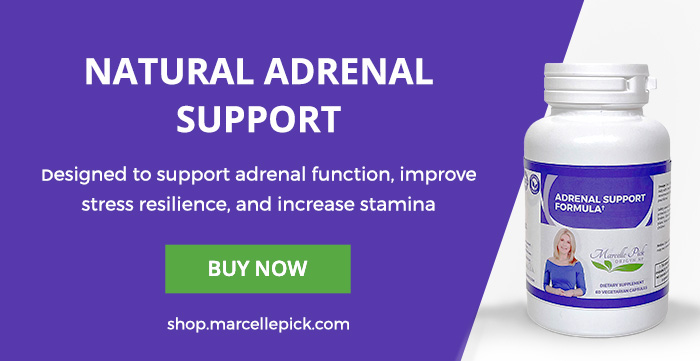Updated 08/27/2023
The past three years have been stressful, to say the least. While anxiety around Covid-19 has subsided, there’s still a lot of crazy things happening in the world, and we’ve all come to realize that things can change in a heartbeat.
Good health isn’t something people take for granted anymore – and that’s actually a good thing! The more aware you are of what impacts your overall health, the more likely you are to adjust your lifestyle to keep yourself feeling your best.
The stress of the past few years left women extremely vulnerable to something I’ve been talking about for decades: adrenal dysfunction.
And here’s something you should know: adrenal dysfunction can make you more susceptible to infection and disease! We’ve all learned best practices for avoiding Covid-19, but shouldn’t we also be putting our energy into keeping our immune system as strong as possible to ward off any infection and inflammation that comes our way?
No matter how careful you are to avoid being exposed to viruses, stress puts all kinds of strain on your body. And stress is unavoidable! Your body perceives (and responds to) all kinds of stressors -physical, emotional, environmental – the same way. Even good stress (like the thrill of a roller coaster ride) has an impact on your stress response. When stress is chronic, your body can end up attacking itself. That’s because of an immune system gone haywire.
This connection between stress, adrenal function, and your immune system is important to understand. I’ve written about this connection in more detail elsewhere, but let’s take a quick look at how stress impacts adrenals, how cortisol impacts immunity and risk of infection, and how you can keep your adrenals and your immune system going strong even if your stress levels are high.
Stress and your adrenal glands
The adrenal glands, located just above the kidneys, produce hormones related to the stress response. The primary player is cortisol, which is so connected to the stress response that it’s often called the “stress hormone”. When cortisol levels are too high or too low, it’s likely that adrenal function isn’t at its best.
Your adrenal glands produce cortisol even when there’s no specific stressors present. That’s in part because your body is always under some kind of stress, and as I said earlier, it doesn’t distinguish between threats to survival and a slight headache. Your body needs some cortisol all the time – you actually can’t live without it! Very low cortisol levels can cause as much difficulty as elevated levels, though in different ways.
Cortisol is the hormone that triggers the “flight, fight or freeze” response which allows your body to respond appropriately to threats. When this response is activated, your body shuts down production of non-essential hormones, which impact digestion, circulation, blood pressure, inflammatory responses, and immune system functioning.
That’s not an issue when the surge of cortisol is temporary, as it is when you’re faced with a true threat to survival. But when your body is under constant strain (as many of us are these days), it becomes a big problem. That’s because if your adrenals are constantly producing cortisol, they aren’t producing other essential hormones.
Remember those other functions I mentioned? Cortisol is a critical piece of the puzzle, especially in regulating the immune system.
Immune function and cortisol
Your immune system is your body’s built in defense mechanism against pathogens. Pathogens are any organisms that don’t belong in your body, including bacteria and viruses.
Your immune system attacks pathogens to protect you by creating inflammation to block the intruders and let your body know tissue repair is necessary. That results in familiar symptoms – runny nose, sore throat, fever or congestion.
Inflammation isn’t all bad; it’s actually part of a healthy immune response. But it needs to be regulated so it doesn’t run amok. That’s where cortisol comes in. Balanced cortisol levels help reduce inflammation and keep things running smoothly during an immune response.
When cortisol levels are too high or too low, your immune system moves off course. This may mean it becomes underactive, not producing enough inflammation to keep the invaders out. Or, it may become hyperactive, causing too much inflammation which can lead to allergies, autoimmunity or chronic disease. Neither sounds like much fun, does it? Trust me, it’s not!
High cortisol and increased infection
When cortisol levels are extremely high, which happens in the early stages of adrenal dysfunction, the inflammatory response initially drops and the immune function essentially slows down.
That means all those pathogens can get in with more ease, and we’re more susceptible to colds, influenza, bacterial infections and viruses – including the coronavirus. And these infections can last longer because our immune system isn’t strong enough to aid in our recovery.
Low cortisol and chronic illness
If your adrenal dysfunction lingers, your body’s response begins to change. Instead of producing too much cortisol to battle high levels of stress, your adrenal glands just can’t keep up. Eventually, they can’t even produce the amount of cortisol you need for survival.
One of cortisol’s responsibilities is to keep an eye on inflammation when an immune response is activated. If there’s not enough cortisol to supervise this process, it’s like leaving a toddler alone with a box of markers and a white wall – the immune system and inflammation go crazy!
That can cause a host of new problems, the kind that make people wince when they hear the word “inflammation.” Chronic inflammation has been shown to have an impact on many troublesome health conditions, including mood disorders, fibromyalgia, chronic fatigue syndrome, obesity, and many autoimmune diseases. In autoimmune disease, the immune system is actually attacking the body’s healthy cells.
Supporting the Adrenals and Your Immune System in Trying Times
Even before the pandemic hit, adrenal dysfunction was one of the top conditions that brought women to my practice. During the pandemic, that number of women who came to me with signs of faulty immune functioning skyrocketed! After treating many of them successfully, I’m confident that the adrenals played a big role in the increased immune issues women experienced.
All too often, these symptoms are treated with a prescription with no regard to finding the root of the problem. A lot of the women I saw during the pandemic said that was their primary health care provider’s first recommendation. But as they discovered, these medications often have no lasting impact because they are simply masking the discomfort, not addressing the cause. There are times when antibiotics or other medications are necessary, but they shouldn’t be the first and only course of action.
If you support your body proactively, you might be able to avoid those symptoms altogether! There are many natural approaches that can bring great relief and restore balance.
Any time I talk about ways to boost immune function, I think it’s also beneficial to talk about adrenal support. Here are 4 natural ways to support your immune system and your adrenals simultaneously.
1. Herbal Support
Adaptogens are powerful herbs that are effective in assisting with regulation of the stress response and managing cortisol levels. These herbs adapt to the unique needs of your body. It can be quite helpful to work with a naturopathic or functional medicine practitioner to find the program that addresses your specific needs. Some adaptogens that are particularly useful for addressing adrenal dysfunction are rhodiola rosea, astragalus root, Schisandra, licorice root, and eleuthero/Siberian ginseng.
2. Nutritional Support
A diet low in inflammatory foods, such as sugar, refined flour, and processed foods in general is important to both your adrenals and your immune system. Whole foods, organic whenever possible, including a wide variety of fruits and vegetables, are best.
It’s increasingly difficult to get all of the nutrients and minerals you need from food, because of the way food is grown in this country. Nutritional supplements, including a high-quality multivitamin, can help you bridge the gap.
Some vitamins and nutrients are especially helpful for supporting adrenals and the immune system, including Vitamin C (which can be depleted in times of stress), B vitamins, Vitamin E, magnesium, calcium, zinc, manganese, and iodine.
3. Emotional support
Nutritional and herbal support are a great start, but this one is non-negotiable. You can’t relieve your body of stress if you aren’t taking care of yourself emotionally.
The pandemic caused a lot of trauma – and much of that is still lingering in our bodies. Unresolved emotions can produce devastating stress. Lingering concern around susceptibility to infection, managing the lasting emotional trauma felt by children and/or aging parents and resulting difficult interactions, and the general uncertainty in the world can trigger old trauma. Finding ways to identify and move beyond emotional barriers is critical in reducing stress and keeping your adrenals strong.
I highly recommend the Emotional Freedom Technique (tapping). It’s hard to describe how helpful this has been for myself and many of my clients. Talking with a therapist or reaching out to trusted friends can also lend you the emotional support you need.
4. Stress Relief
It can be obvious after reading the impact of stress on health that finding ways to relieve that stress will help. It’s not always so obvious just how to do that! The most important thing I can say is that your methods of stress relief may not resemble someone else’s at all. That’s okay! It’s not what you do, but the ability to clear your mind and experience joy for a little while that’s important.
That said, I do have some suggestions that have worked for many of my clients. Check them out to see if any resonate.
- Find an online yoga or meditation class.
- Spend time outdoors – preferably in a beautiful natural area (hiking trails in a state park or relaxing on a gorgeous beach)
- Have a dance party – with your family or by yourself.
- Read or watch something that makes you laugh – laughter is an amazing stress release tool.
- Keep a gratitude journal.
- Do something creative – paint, write, sing, sculpt – anything that draws your full attention and chases worried thoughts away for a while.
- Move your body! Take a long walk around your neighborhood, go for a bike ride, run, dance, jump rope or hula hoop.
- Play online games with family members – you can even create a regular schedule
Stress is here to stay, even as life has returned to a more normal feel. You can’t let it control your life and ruin your built-in protection! Take a few minutes every day to care for yourself, especially if you’re supporting and caring for others. You can’t be at your best for them if you aren’t showing up for yourself!








